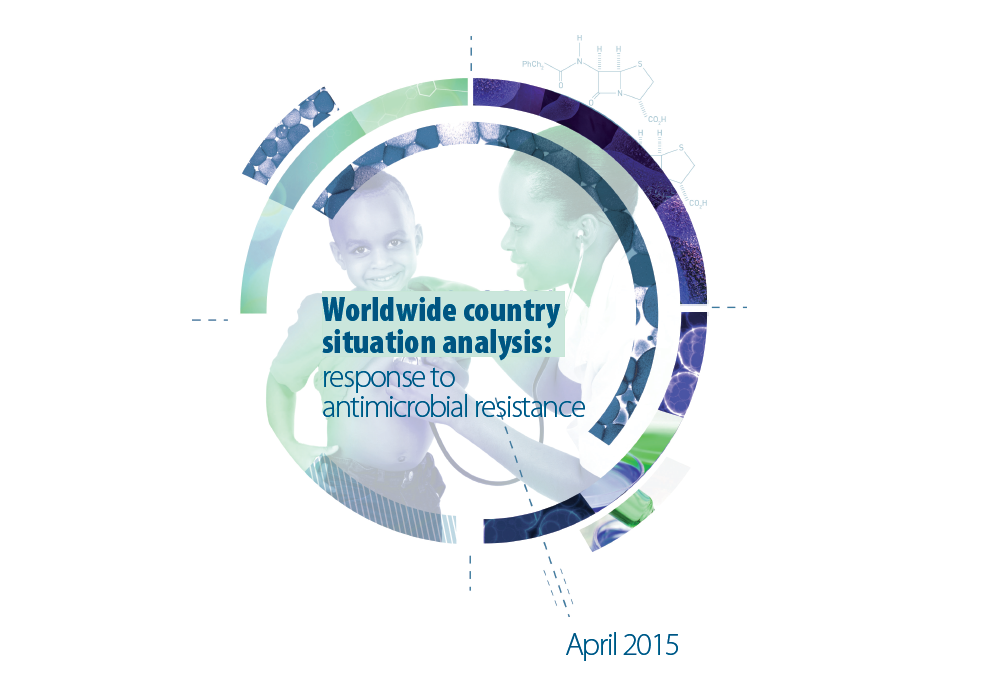
This survey is the first to capture governments’ own assessments of their response to resistance to antimicrobial medicines used to treat conditions such as bloodstream infections, pneumonia, tuberculosis, malaria and HIV.
29 APRIL 2015 | GENEVA - A quarter of countries that responded to a WHO survey have national plans to preserve antimicrobial medicines like antibiotics, but many more countries must also step up. A new report, "Worldwide country situation analysis: Response to antimicrobial resistance", which outlines the survey findings, reveals that while much activity is underway and many governments are committed to addressing the problem, there are major gaps in actions needed across all 6 WHO regions to prevent the misuse of antibiotics and reduce spread of antimicrobial resistance.
“This is the single greatest challenge in infectious diseases today,” says Dr Keiji Fukuda, WHO’s Assistant Director-General for Health Security. “All types of microbes—including many viruses and parasites—are becoming resistant to medicines. Of particularly urgent concern is the development of bacteria that are progressively less treatable by available antibiotics. This is happening in all parts of the world, so all countries must do their part to tackle this global threat.”
Issued a year after WHO’s first report on the extent of antimicrobial resistance globally, which warned of a ‘post-antibiotic era’, this survey—which was completed by 133 countries in 2013 and 2014—is the first to capture governments’ own assessments of their response to resistance to antimicrobial medicines used to treat conditions such as bloodstream infections, pneumonia, tuberculosis (TB), malaria and HIV. It summarizes current practices and structures aimed to address the issue, and shows there are significant areas for improvement.
“While there is a lot to be encouraged by, much more work needs to be done to combat one of the most serious global health threats of our time,” says Dr Fukuda. “Scientists, medical practitioners and other authorities including WHO have been sounding the warning of the potentially catastrophic impact of ignoring antibiotic resistance. Today, we welcome what has been achieved so far, but much more needs to be done to avoid losing the ability to practise medicine and treat both common and serious illnesses.”
Key findings of the report include:
WHO, countries and partners have developed a draft Global Action Plan to combat antimicrobial resistance, including antibiotic resistance, which has been submitted to the sixty-eighth World Health Assembly, taking place in May 2015. Governments will be asked to approve the plan and, in doing so, declare their commitment to address a problem that threatens global health as we know it. One essential step in implementing the Global Action Plan would be the development of comprehensive national plans in countries where they are now lacking and further develop and strengthen existing plans.
Highlights of report by WHO region
WHO African Region
(8 out of 47 Member States in the region participated in the survey)
WHO Region of the Americas
(26 out of 35 Member States in the region participated in the survey)
WHO Eastern Mediterranean Region
(13 out of 21 Member States in the region participated in the survey)
WHO European Region
(49 out of 53 Member States in the region participated in the survey)
WHO South-East Asia Region
(All 11 Member States in the region participated in the survey)
WHO Western Pacific Region
(26 out of 27 Member States in the region participated in the survey)
Notes to editors
The 133 countries that participated in the survey:
WHO African Region:
Burkina Faso, Central African Republic, Gambia, Ghana, South Sudan, United Republic of Tanzania, Uganda, Zambia.
WHO Region of the Americas:
Antigua and Barbuda, Argentina, Barbados, Belize, Bolivia (Plurinational State of), Brazil, Canada, Chile, Colombia, Costa Rica, Cuba, Dominica, Dominican Republic, Ecuador, El Salvador, Guatemala, Guyana, Honduras, Jamaica, Mexico, Nicaragua, Paraguay, Peru, Saint Kitts and Nevis, Suriname, Uruguay.
WHO Eastern Mediterranean Region:
Afghanistan, Bahrain, Egypt, Iran (Islamic Republic of), Jordan, Lebanon, Morocco, Oman, Pakistan, Saudi Arabia, Sudan, Syrian Arab Republic, United Arab Emirates.
WHO European Region:
Albania, Armenia, Austria, Azerbaijan, Belarus, Belgium, Bosnia and Herzegovina, Bulgaria, Croatia, Cyprus, Czech Republic, Denmark, Estonia, France, Georgia, Germany, Greece, Hungary, Iceland, Ireland, Israel, Italy, Kazakhstan, Kyrgyzstan, Latvia, Lithuania, Luxembourg, Malta, Montenegro, Netherlands, Norway, Poland, Portugal, Republic of Moldova, Romania, Russian Federation, Serbia, Slovakia, Slovenia, Spain, Sweden, Switzerland, Tajikistan, The former Yugoslav Republic of Macedonia, Turkey, Turkmenistan, Ukraine, United Kingdom, Uzbekistan.
WHO South-East Asia Region:
Bangladesh, Bhutan, Democratic People’s Republic of Korea, India, Indonesia, Maldives, Myanmar, Nepal, Sri Lanka, Thailand, Timor-Leste.
WHO Western Pacific Region:
Australia, Brunei Darussalam, Cambodia, China, Cook Islands, Fiji, Japan, Kiribati, Lao People's Democratic Republic, Malaysia, Marshall Islands, Micronesia (Federated States of), Mongolia, New Zealand, Niue, Palau, Papua New Guinea, Philippines, Republic of Korea, Samoa, Singapore, Solomon Islands, Tonga, Tuvalu, Vanuatu, Viet Nam.
Related links
Source: WHO